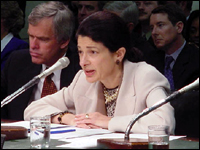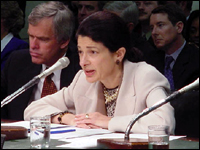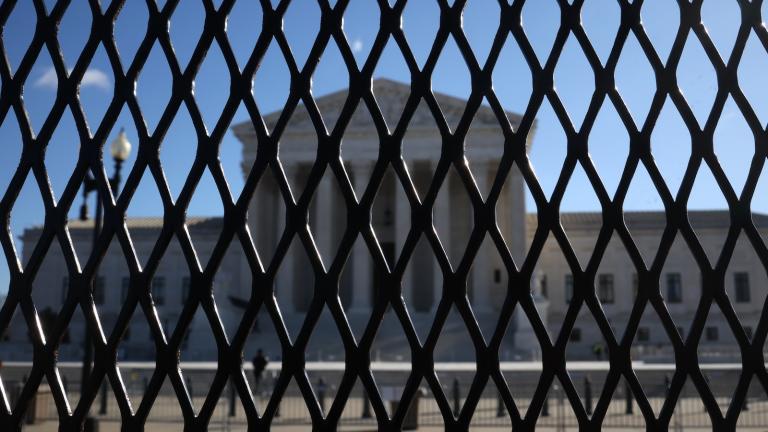Last week, an international task force co-chaired by Republican Sen. Olympia Snowe (Maine) predicted a fast-approaching “point of no return” for climate change — possibly in as few as 10 years — after which the crisis and its symptoms will be irreversible.

Sen. Olympia Snowe (R-Maine).
You probably didn’t read about it in the U.S. papers, which largely ignored the findings — just as you probably haven’t been reading much about the Kyoto Protocol, though the treaty will go into effect in less than two weeks, with the conspicuous noncooperation of the world’s most heavily polluting nation.
But, even as the Bush administration tries its darndest to pretend that nothing fishy is afoot with the climate, a handful of Republicans in the Senate are emerging as leaders in the fight against global warming — and we don’t just mean John McCain (R-Ariz.).
Take, for instance, Sen. Chuck Hagel (R-Neb.), who led the congressional fight to reject Kyoto in 1997, opposes the McCain-Lieberman Climate Stewardship Act, and consistently supports the Bush administration’s stance (or lack thereof) on global warming. Not an impressive record — and yet Hagel is now declaring climate change a “top-tier issue,” says his spokesperson Mike Buttry, and is preparing to introduce “one of the most comprehensive climate bills that have been proposed to date. It will have a domestic piece, an international piece, and a tax piece.”
Hagel told his home-state paper, the Lincoln Journal Star, that his bill, which will be introduced in February, is compatible with the new climate strategy being cooked up by British Prime Minister Tony Blair. These remarks came soon after the senator met with Blair to discuss an idea for an international agreement dubbed by some insiders “Kyoto-lite,” which the P.M. is reportedly crafting with the hope that President Bush will get on board. The agreement as envisioned would require the administration to acknowledge the scale of the climate crisis and commit to developing the technology necessary to manage it. No mention thus far of mandatory limits on greenhouse-gas emissions — presumably that’s why Blair thinks Bush might go for it. Likewise, Hagel’s bill includes no compulsory emissions caps — rather, it’s “incentive-based,” says Buttry.

Sen. Chuck Hagel (R-Neb.).
According to David Doniger, policy director of the Climate Center at the Natural Resources Defense Council, Hagel may be trying to use the climate issue to his political advantage: “He wants to position himself between Bush and McCain in preparation for 2008.” Rumor has it that Hagel may make a run for president, and thus he’s trying to show leadership on climate change without ruffling any right-wing feathers.
Doniger doesn’t think Hagel is going nearly far enough. “If you recognize the existence of the problem but don’t endorse what needs to be done about it, you don’t deserve credit,” he says.
But the fact that a senator with presidential ambitions believes it is to his political advantage to take on climate change is itself a mark of progress. Hagel’s actions pose a strong challenge to Republican naysayers like Sen. James Inhofe (R-Okla.), who last month dismissed global warming as a giant hoax.
Hagel’s meeting with Blair also indicates a growing acceptance among Republicans that the U.S. needs to collaborate internationally on climate change. At the very least, the Nebraska senator will stoke the debate on Capitol Hill with upcoming public appearances focusing on climate change, such as the presentation he is scheduled to make at a Brookings Institution briefing next week, alongside Sen. John Kerry (D-Mass.).
Let It Snowe …
Snowe, who does support mandatory caps on greenhouse gases, will be forcing the climate debate as well, says her press secretary Preston Hartman: “You can expect to see her introduce several bills this year related to climate change that reflect the task force recommendations.” She doesn’t necessarily expect these initiatives to pass, says Hartman, but she wants to “get them out there and get them talked about, which will grow the broad support for action.”
The cadre of Congress members who dismiss climate change as a hoax may be influential, Hartman says, “but it is small. Snowe’s camp is growing. The consensus is growing.”
Other Republicans who have voiced support for greenhouse-gas caps are Sens. Lincoln Chafee (R.I.), Susan Collins (Maine), Judd Gregg (N.H.), and Dick Lugar (Ind.), as well as, of course, McCain. Among those on the fence but considered persuadable are Sens. Norm Coleman (Minn.), Gordon Smith (Ore.), Arlen Specter (Penn.), and John Sununu (N.H.).
While the majority of Democrats are already in the pro-cap camp, a few in coal-producing states have staunchly opposed regulation, such as Robert Byrd (W.V.), who led the opposition against Kyoto with Hagel. But, says Doniger, “Even Byrd is now coming around. He has stated recently that climate change is real, it’s now, it’s a fact that can’t be ignored. That’s a far cry from where he was five years ago.” Word is, in fact, that Byrd rebuffed an invitation from Hagel to cosponsor his bill because it wasn’t strong enough. Sen. Max Baucus (Mont.), another Democrat who hasn’t always been a fan of addressing climate change, is also warming up to the issue; he’s voiced opposition to Bush’s Clear Skies Act on the grounds that it doesn’t tackle carbon-dioxide emissions.
Perhaps even more powerful than the shift of attitudes on Capitol Hill is the growing support for regulations among industry leaders. “The only way you’ll convince the administration to change its position on greenhouse-gas regulation and truly get a sea change in Congress is to bring industry on board,” says Doniger.
That may not be as hard as you’d think. Major energy companies including American Electric Power and Xcel Energy have put out public statements in the last year acknowledging the need to regulate emissions. “Give us a date, tell us how much we need to cut, give us the flexibility to meet the goals, and we’ll get it done,” Xcel CEO Wayne Brunetti said of climate-change regulations last year in a BusinessWeek article.
This industry reality check arises from bottom-line concerns: If the problem is real and caps are inevitable (in the next administration, if not this one), it’s less costly for industry to prepare for the regulations in advance and implement them gradually than to face steep cuts that must be achieved hastily.
“Sooner or later we’ll reach a tipping point of concern in industry and Congress,” says Doniger. “The White House will have no choice but to follow.” The evidence seems to be mounting that it’ll be sooner rather than later.



